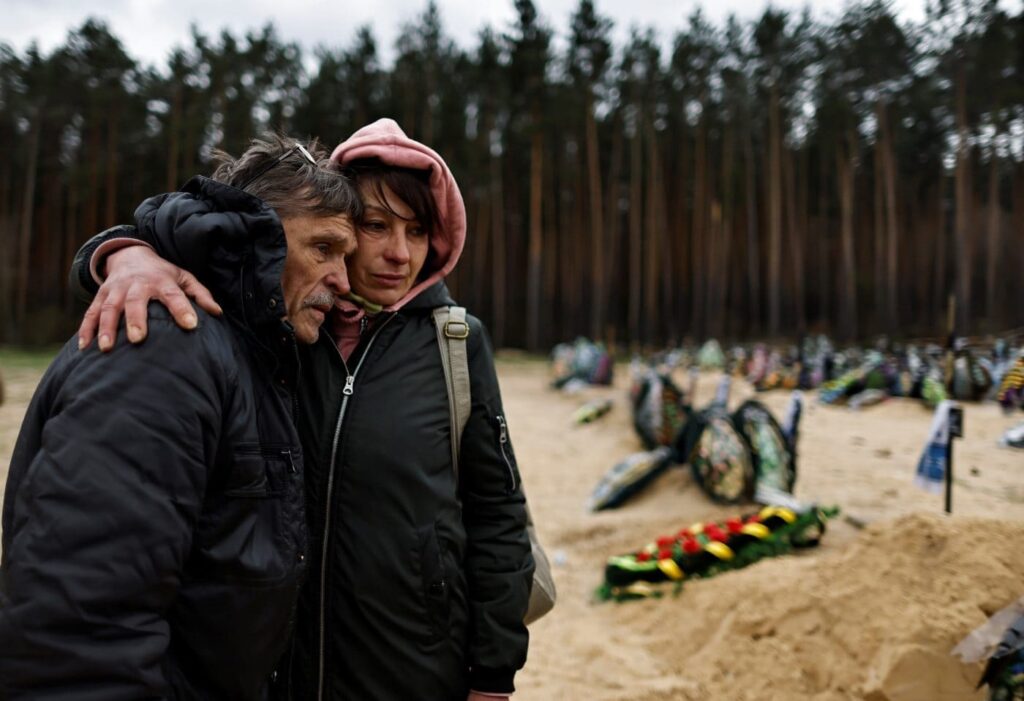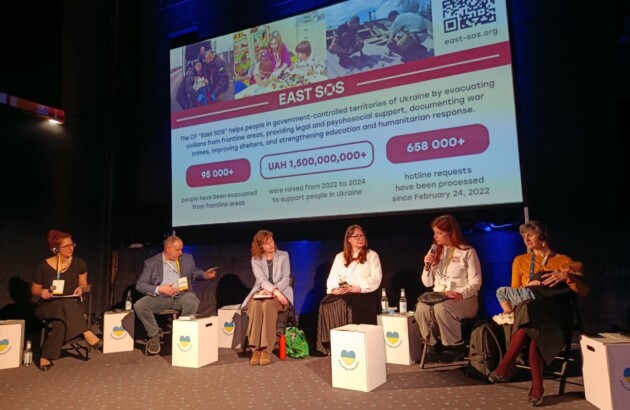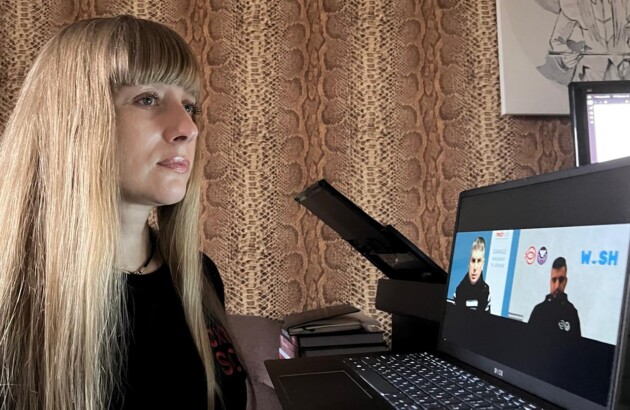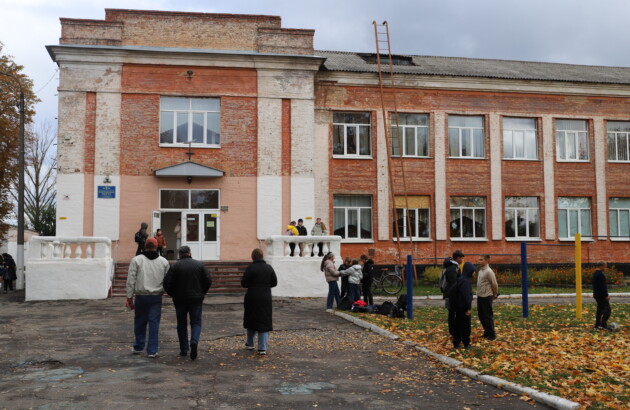Ukraine’s Crime Chroniclers: Keeping the Flame of Justice Alive
It’s been two years since the Ukrainian army liberated the little towns to the northwest of Kyiv but work to identify the Russian killers continues.
With Center for European Policy Analysis (CEPA) we tell the story of friends who helped to evacuate civilians from Irpen on the link and read the reprint of the material below.
Ukraine’s Crime Chroniclers: Keeping the Flame of Justice Alive
By Tetiana Bezruk
It’s been two years since the Ukrainian army liberated the little towns to the northwest of Kyiv but work to identify the Russian killers continues.
In 2022, as the Russian army blasted its way toward Ukraine’s capital city, the small towns of Irpin, Bucha, and Borodyanka became watchwords for national resistance and Kremlin-endorsed war crimes.
Some 27 months later, the streets have been cleared of broken-down Russian vehicles, walls damaged by artillery strikes have been repaired, and locals have returned and spend weekends in a park in their centers.
But the work of the crime chroniclers has not ended. The charitable foundation, East SOS, continues to document Russian war crimes and collect the stories of occupation victims. The foundation supports civilians in voicing their concerns and in helping law enforcement agencies identify the Russian commanders and soldiers who committed these crimes.
One day, they hope men like Lt-Col Azatbek Omurbekov, the so-called Butcher of Bucha who was seen standing next to Putin at his May 10 victory parade, will be arraigned in court.
One of the stories documented by East SOS concerns a group of friends who helped evacuate civilians from Irpin. Like the heroes from a novel, Vladyslav Samoilenko and Anton Senenko risked their lives, coming under mortar fire to save several families from the Kyiv suburbs. This story is now over, but everyone in Ukraine is aware that such tragedies continue to occur in other towns and villages on the front line.
Svitlana Artemenko lived in Lugansk in Eastern Ukraine (her name and former hometown have been changed.) Until April 2014, she had no plan to move; she had friends and a job. However, in the spring of 2014, Russian troops launched a military operation in the Donetsk and Luhansk regions and the Autonomous Republic of Crimea. She didn’t want to live under Russian occupation and moved out of Lugansk.
Svitlana chose Irpin. Later she bought a house there, brought her relatives to join her, and started her life from scratch. A new place, a new house, a new job, and numerous acquaintances. All of which changed on February 24, 2022.
“I remember the news told a lot about the coming war. But I couldn’t believe it. Probably that was because, in my Soviet childhood, I heard about Ukrainian and Russian friendship for many years. I refused to believe it, even though I realized how serious it was,” she said.
On that terrible morning, Svitlana was awakened by a phone call from her neighbor. She said: “The war has begun”. It was 5 am and she could not quite understand what was going on. “The war has begun, our cities are being bombed,” the neighbor kept saying.
“I didn’t want to leave. I decided not to run away for the second time. If I was destined to die, I would die in this house in Irpin. That was my decision. My neighbor came to me and said: ‘Svitlana, let’s go.’ But I said: ‘No.’”
While she conferred with relatives and neighbors, 30-year-old Vladyslav Samoilenko, a former employee of the Ministry of Infrastructure, was about to get weapons 20km (12 miles) away in Kyiv.
“I was surprised to see the mobile connection because I thought it would disappear immediately. We even agreed on the following: a blue towel on the balcony meant that everything was fine. A white one meant that I was not at home,” he says.
Vladyslav received a call from his friend, the activist and scholar Anton Senenko. It was the end of February, and Senenko had already evacuated several families trying to get to the train station and was driving doctors around Kyiv because public transportation had stopped. Even though the news reported that the Russians were close, Senenko began to help deliver food to Irpin.
On March 3, Anton, Vladyslav, and their friends formed a convoy of civilian cars and drove to the town carrying packed food.
“We were traveling like blind kittens in a convoy, not knowing where we were and what we were doing”, says Senenko. “That’s when I saw mortar fire for the first time”, he says. “Shells were just exploding in the neighboring yard, everything was flying.”
The next time they drove to Irpin, they aimed to evacuate people and did so under constant artillery fire. Not everyone managed to leave, even with large white sheets and the word “Children” written on the car.
“The shelling was intensifying, and Russian helicopters and aircraft were flying overhead. I saw them and distinguished them from the Ukrainian ones. And it was quite scary, it was getting scarier every day”, says Artemenko, who was still in Irpin in early March. “There were no basements or cellars in my house, so we moved to our neighbor’s place.”
She decided to leave after the neighboring house was hit. “We packed up in five minutes and left. It was March 2.” Only as they walked through the central streets of Irpin did she see how widespread the destruction was. Sometime later, her home was destroyed and burned. Only the walls were left.
She added: “The Russians are killing our memories. I took everything out of Lugansk: family photos, my mother’s embroidery, some very expensive things. I wrote down the history of my family and saved it on my laptop. But the photos, the embroidery, and the laptop were all burned to nothing . . .”
The story of Svitlana, Anton, and Vladyslav was recorded by the East SOS team. Founded in 2014, the foundation has to date evacuated about 80,000 civilians from near the front line.
East SOS Charitable Foundation also documents Russian war crimes. The Foundation carries out this work to preserve the memory of events related to the Russian-Ukrainian war and to share the testimonies of witnesses and victims with law enforcement agencies.
Anyone wishing to help the foundation should click here.
Tetiana Bezruk is a Ukrainian journalist and war correspondent.
Europe’s Edge is CEPA’s online journal covering critical topics on the foreign policy docket across Europe and North America. All opinions are those of the author and do not necessarily represent the position or views of the institutions they represent or the Center for European Policy Analysis.
The documentary team is gathering stories from civilians about war crimes committed by the russian army against the people of Ukraine to submit to international human rights courts.
This publication was produced within the project “Support for vulnerable and hard-to-reach groups in war-affected Ukraine” with the financial support of the European Union. Its contents are the sole responsibility of CF “East SOS” (Vostok SOS) and do not necessarily reflect the views of the European Union.



